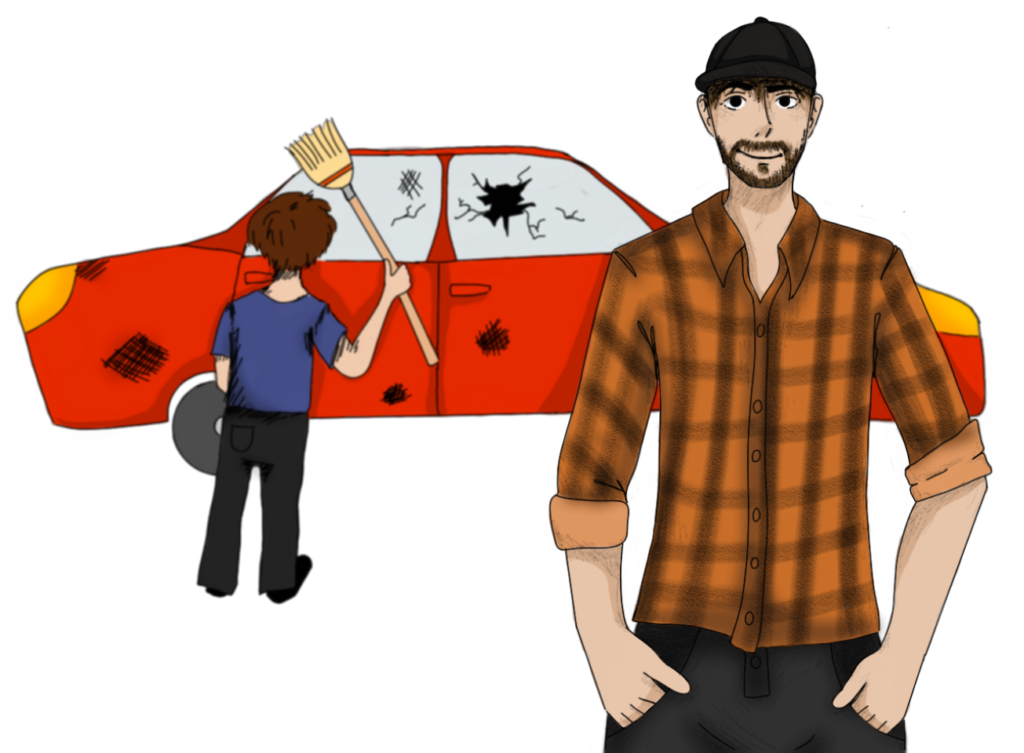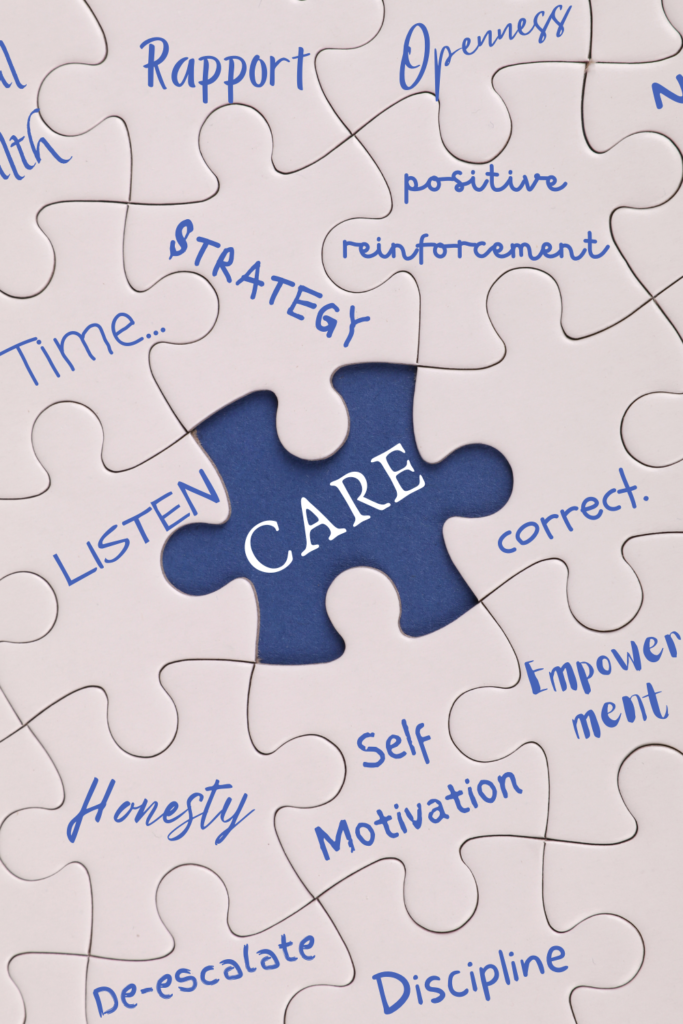{9min read}

assaulted vehicles… hot dog walls…
litres of spit… ingested cigarette butts…
ALL kinds of smells…
Drugs…
verbal Abuse… temper tantrums…
piles of vomit…
burnt dinners… honey soaked floors…
tall stories… manipulation…
broken families… dead friends…
lies…
It’s all just a typical day for a youth worker!
Just off the top of my head I’m remembering a wall being poked through with the broom,
a smashed coffee mug because a boy wanted gatorade but not to go to training, witnessing cars turn into golf balls, finding stale bread on my door handle (? … Yeah, I have NOOO idea either :\ )
… Come to think about it, that was all over 3 days!!! 😐
With your own child however, there is no break. There is no next shift. There is no calling in.
Parenting is inescapable
Parenting is real life.
The Real Game.
As I was beginning my parenting journey with a bag full of skills, a ton of experience, proven strategies and on the back of some big successes, I naively thought this would be easy…

All of the youth work skills are amaaazing,
WHEN YOU CAN GIVE THE CHILD BACK!!!
I had even JUST restudied a section on personal care and regulating emotions…
Growing up I heard a million times that ‘child care is easy, because you can give them back’.
Now it all makes sense!
Asking someone to clean up after themselves, no problems.
Cleaning up after someone else’s laziness, sure.
Driving people places, ok.
Losing sleep to worry about someone else, sometimes.
Ignoring bad attitude to teach a life lesson, usually.
Doubling back to address the bad attitude, always.
Always.
That is the parenting problem.It’s everything
All the time
ALWAYS
&
FOREVER.
In one of my schools there was a much needed policy for the care department.
If we were getting overwhelmed at all, we could take a break, recenter, and then get back to it when we were recharged.
Most days were fine, but when that little boost was needed, just knowing that option was there made everything so much easier.
At the end of the day we are taking on a lot of emotion from these little humans, so we need to be sure we are doing okay ourselves.
While working with another organisation the manager honed in on how the time was being used. Probably due to outside pressure they were beginning to micromanage our time.
When I had important reports to complete and no time to do them, I was told to be with clients.
After dealing with escalations and evacuations I was expected to just suck it up and move on.
No processing time. Actively criticised for mandatory reporting. Given attitude, no questions.
Those experiences were testing, but going home to complete freedom made it all worth it.
The effort put in had an obvious effect on my bank account each week.
The hard times were a fraction of the day.
And I didn’t need to obsess over the tough stuff.
As a parent, this stuff is life.
It is important.
There is no one coming to help.
There certainly isn’t any sick days.
You have to see the problems coming,
you need to put yourself aside,
you need to sacrifice something,
you need to prep,
you need to discipline,
you need to make the choices… You suffer the consequences.
SYSTEMS (decide beforehand!).
As well as having the professional experiences and training to rely on, I am also a massive self improvement nerd. I love learning about how and why we all do the things we do.
Working through a personal issue that’s holding me back gives me excitement and somewhere to focus my energy. Discovering new things about our mind or body thrills me.
In all of the self improvement research one thing stands out.
Have A Plan.
Without a plan, without a goal, without some form of direction we tend to just… drift
Blown around by the winds of whatever fresh new change is sweeping us along.
At the mercy of fate.
Youth Work Tool Kit
– build rapport quickly
– empower children
– deescalate behaviour
– show openness
– be radically honest
– positive reinforcement
– motivate the children
– self-motivation in the children
This might work well for a time, when it comes to parenting however a solid strategy is the easiest way to survive.
When it’s late… after a looong day dealing with work garbage… rushing to get dinner sorted, and suddenly there’s an attitude to deal with, or unfinished homework to manage, dropping the ball is eeeaaasy and oh so appealing!
Prep.
The first thing I changed was simply catching anything that bothered us, and beginning to eliminate those behaviours.
There were a few thoughts behind it :
- First of all, if our children are doing things that annoy us… we are going to be annoyed at them. Having this tension in the house, causing children to walk on eggshells around us, and not expressing our feelings is going to have a negative effect over time
- Secondly, in life our children are going to need to have self control around certain behaviours at certain times. Like not talking while on shifts at work, not playing with their hair in a kitchen, even just loud chewing could repulse someone they are trying to impress
- Lastly, it is a simple way to begin showing the child that there is a boundary. That we are serious about our expectations. And that there are consequences in life to our choices
Dr Jordan Peterson has an interesting approach to parenting, and a really good point on this!
Do not let your child do anything that makes you dislike them
~ Dr Jordan Peterson
By starting here, I was able to handle more attitude and avoid getting frustrated. With a lot of the day to day things that would bother me disappearing there was mental space to tackle the real issues… but what are the real issues?!
Discovery.
With warmer feelings towards our children, and with some of the pressure gone, it’s time to start watching more closely.
Taking at least three weeks to discover more about our children will give us a truer representation of what is going on. From here we take the time to ask ourselves some questions
What patterns do I see over the week, the month, the year?
How could my child’s life be better?
What is missing?
Is there anything my child is struggling with?
Are there any outside influences controlling these behaviours?
What are the common themes?
If these behaviours continue, what kind of person is my child becoming?
What are the most important things to deal with?
Now, if we craft a discipline plan here we can be completely wrong, doing damage instead of simplifying our parenting.
Our child is the person who will be affected the most by any changes we make… So why not talk with them?
Having a teenager made this easier, because there was a lot more that was understood and age appropriate. With younger children I have just adjusted the topics to make sure they were age appropriate, used simpler language, and made sure they were repeating back a lot of what I said (all in small bursts to keep attention!)
Opening up about our expectations shows the children the boundary. It is our best chance at having them remember (and care) about what is expected. And… it’s a conversation we can point back to when our little humans are pushing things.
You might even be able to compromise,
dropping some of the lesser expectations in favour of others that matter to you.
(which will help your child feel involved and a part of the changes 😉 )
Planning.
FINALLY, We can begin to strategise!
By sitting down, talking to anyone that will listen, scouring the internet and eventually talking with your child you can have a draft of your expectations.
To keep it simple, I recommend majoring on 2 or 3 different things at a time. For instance, eating breakfast, cleaning their bedroom and watching attitude.
Eating is simple, and most people do it most days.
Making a bed and cleaning up a bedroom is a typical expectation, but hasn’t got an instant reward like eating (full stomach)
Watching attitude is trickier. There is nuance, so so many variables, and contextual. We can even influence the attitude if we come in with one ourselves!
Having a medium and a difficult expectation set out our little people are being pushed.
They will need to grow and adapt, learning new skills
Strategically throwing in an easy expectation they should also be able to get some big wins!
…More on that another time 😉
HARD NOW, HARDER LATER.
One selfish altruism for life… Either we can do something difficult now, or we can do the easy thing now… creating a more difficult something in the future…
If you just let your hair grow it’s going to get long and matted, and dreads are hard to cut.
If you spill milk in the kitchen and just ignore it, eventually the kitchen will smell.
If you don’t do the dishes, they pile up and get mouldy.
Hard now, or Harder later.
If we ignore bad behaviour now, it becomes the personality
If we ignore the child now, they grow up with attachment issues
If we ignore healthy eating, we end up with eating disorders
If we teach by living laziness, our child should never be expected to do anything for themselves…
Back to earlier… it’s late… after a looong day dealing with work garbage… rushing to get dinner sorted, and suddenly there’s an attitude to deal with, or unfinished homework to manage, dropping the ball is eeeaaasy and oh so appealing!
The easy option : Ignore the behaviour and eat.
The hard option : Pause what you are doing, address the attitude, explain the known consequence
Battle Plan.
- – Self Care. Control Your Emotions.
- – Don’t allow Your Child to Do Anything That Annoys You.
- – Take Notes (Watch)
- – Questions
- – Level With Your Child
- – Strategise
- – Set Expectations
- – Do It! (Hard Now, Harder Later)
Keep an eye out,
In the coming weeks I will be diving in to more topics and sharing more stories… sometimes as they happen!
Find Us on Socials, Join the Support Group or Share Your Ideas in the comments 😀




